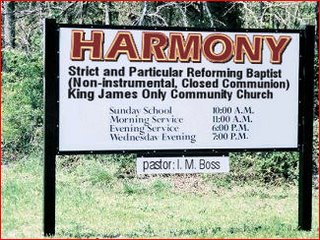
By Phillip Johnson
We've been noticing and remarking on the ever-increasing number of denominations, church splits, and intramural sectarianism in the wider Protestant world. This not an issue Protestants can or should easily sweep aside. It is quite true that schism is a fruit of sin and unfaithfulness, and it hurts our testimony.
The apostle Paul rebuked the Corinthians for having a sectarian spirit: "Each one of you is saying, 'I am of Paul,' and 'I of Apollos,' and 'I of Cephas,' and 'I of Christ.' Has Christ been divided? Paul was not crucified for you, was he? Or were you baptized in the name of Paul?" (1 Cor. 1:12-13). Later in the epistle he added, "For when one says, 'I am of Paul,' and another, 'I am of Apollos,' are you not mere men? What then is Apollos? And what is Paul? Servants through whom you believed, even as the Lord gave opportunity to each one" (3:4-5).
Deliberately causing schisms in the body of Christ is a demonic sin—so much so that divisive people are not to be tolerated in the church. In Matthew 18, Christ outlined a series of four steps churches should go through in calling a sinning brothers to repentance. But when someone is schismatic, Paul says, that discipline process may be accelerated. He wrote in Titus 3:10-11: "Reject a factious man after a first and second warning, knowing that such a man is perverted and is sinning, being self-condemned."
It's fair to ask, then, if schism is such a serious sin, why are there so many different denominations? The Protestant Reformation gave rise to Lutheranism, Presbyterianism, Anglicanism, Congregationalism, Methodism, Episcopalianism, the Plymouth Brethren, the Open Brethren, the Closed Brethren, the Church of Christ, the Church of the Nazarene, the Church of God, the Assemblies of God, Holiness churches, Pentecostal churches, Dutch Reformed churches, Christian Reformed churches, Protestant Reformed churches, Baptists, Reformed Baptists, Sovereign Grace Baptists, Landmark Baptists, Independent Baptists, American Baptists, Southern Baptists, Freewill Baptists, General Baptists, Regular Baptists, Particular Baptists, and Strict and Particular Baptists.
And that list only scratches the surface. The Handbook of Denominations lists hundreds more.
Let's be honest: one can hardly blame non-Christians for being nonplussed by the variety. The pagan from a non-Christian society is not likely to look at Christendom and say, "Behold, how they love one another."
The Necessity of Separation
On the other hand, we who are Christians must understand that Christendom is not "the church." All who call themselves Christians are not true followers of Christ—and there's no reason we should try to make Moslems or Hindus think all varieties of so-called Christianity are truly Christian.
Just because a church or denomination calls itself "Christian" does not mean it is part of the body of Christ. That has been true even from biblical times. Consider, for example, the seven churches in Revelation 2 and 3. At least one was totally apostate and three or four others were already apostatizing. We know from Jesus' warning to the church at Laodicea that it is possible for a church to abandon the truth so completely that Christ Himself will reject that church and spew it out of His mouth.
True Christians must not fellowship with such apostate groups (2 Cor. 6:15-17; Eph. 5:11).
In other words, some degree of doctrinal purity is a valid prerequisite for organizational unity. It's simply wrong to set aside all our doctrinal differences for the sake of an artificial organizational "unity." This is particularly true of those doctrinal issues that are immediately germane to the gospel. In fact, the apostle Paul taught that so-called "Christians" who corrupt or compromise the utter freeness of justification are not to be regarded as brethren at all! He pronounced a curse on them (Gal. 1:8-9). The apostle John taught the same thing (2 John 7-11).
Since the major point at issue between Protestants and Catholic or Orthodox traditions is the gospel (particularly the doctrine of justification by faith—which is the very point Paul wrote to defend in his epistle to the Galatians), it is utterly fatuous to suggest that a show of external unity should take precedence over our doctrinal differences. It is tantamount to saying Christians are not supposed to be concerned with truth at all.
Is organizational solidarity what Jesus meant by unity? That's a question worth examining, and we'll take it up in the next entry.
No comments:
Post a Comment